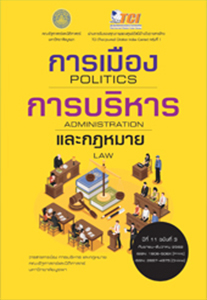ภาวะผู้นำที่ส่งผลต่อประสิทธิผลในการปฏิบัติงานของบุคลากร สำนักงานเขตหนองแขม กรุงเทพมหานคร
บทคัดย่อ
การวิจัยครั้งนี้มีวัตถุประสงค์ 1) เพื่อเปรียบเทียบประสิทธิผลในการปฏิบัติงานของบุคลากรสำนักงานเขตหนองแขม กรุงเทพมหานคร จำแนกตามปัจจัยส่วนบุคคล และ 2) เพื่อศึกษาความสัมพันธ์ระหว่างภาวะผู้นำกับประสิทธิผลในการปฏิบัติงานของบุคลากรสำนักงานเขต หนองแขม กรุงเทพมหานคร กลุ่มตัวอย่างที่ใช้ในการวิจัย คือ บุคลากรสำนักงานเขตหนองแขม จำนวน 235 คน โดยใช้แบบสอบถามเป็นเครื่องมือในการเก็บรวบรวมข้อมูล สถิติที่ใช้ในการวิเคราะห์ข้อมูล ได้แก่ ค่าความถี่ ค่าร้อยละ ค่าเฉลี่ย ส่วนเบี่ยงเบนมาตรฐาน การทดสอบทีกรณีสองประชากรเป็นอิสระกัน การวิเคราะห์ความแปรปรวน หากพบความแตกต่างจะทดสอบความแตกต่างเป็นรายคู่ โดยวิธี LSD (Least Significant Difference) และทดสอบความสัมพันธ์โดยใช้ ค่าสัมประสิทธิ์สหสัมพันธ์แบบเพียร์สัน ผลการศึกษาพบว่า 1) การเปรียบเทียบประสิทธิผลในการปฏิบัติงานของบุคลากรสำนักงานเขตหนองแขม กรุงเทพมหานคร จำแนกตามปัจจัยส่วนบุคคล พบว่า เพศ อายุ ระยะเวลาการปฏิบัติงานในองค์กร มีผลต่อประสิทธิผลในการปฏิบัติงานแตกต่างกัน ยกเว้น สถานภาพ ระดับการศึกษา ไม่แตกต่างกันอย่างมีนัยสําคัญทางสถิติที่ระดับ 0.05 และ 2) ความสัมพันธ์ระหว่าง รูปแบบภาวะผู้นํากับประสิทธิผลในการปฏิบัติงานของบุคลากรสำนักงานเขตหนองแขม กรุงเทพมหานคร พบว่า ภาวะผู้นําแบบสนับสนุน ภาวะผู้นําแบบมุ่งผลสําเร็จ ภาวะผู้นําแบบมีส่วนร่วม ภาวะผู้นําแบบสั่งการ มีความสัมพันธ์กับประสิทธิผลในการปฏิบัติงานอยู่ในระดับค่อนข้างต่ำในทุกด้านและเป็นไปในทิศทางเดียวกัน อย่างมีนัยสำคัญทางสถิติที่ระดับ 0.05






